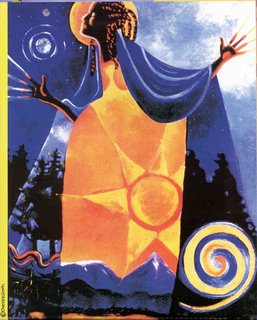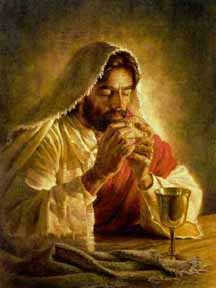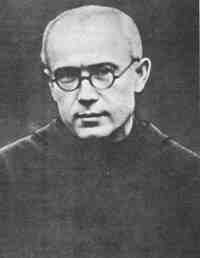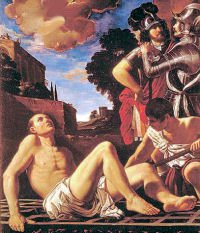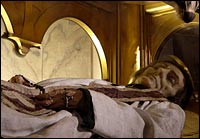 Feast of the Lord’s Transfiguration
Feast of the Lord’s Transfiguration
Mk 9:2-10
CONQUER YOUR MOUNTAINS
Mk 9:2-10
Everybody loves mountains. Mountains are not only overwhelming with their height but also with their beauty.
No one ignores a mountain. By its very nature, a mountain is imposing. We can either cross it or go around it. We can conquer it or it can conquer us. Conquering a mountain means climbing it. Cursing it means being conquered by it.
Jesus faces a mountain today. He does not curse it; He climbs it. He does not take the easy way by going around it; He makes the difficult choice by crossing it. Jesus does not allow the mountain to conquer Him; He conquers it instead.
Jesus is on His way to Jerusalem today. In Jerusalem, He will die on top of another mountain. He makes the kind of “trip to Jerusalem” that does not go around chairs, as we have it in our parlor games, but crosses mountains.
Mountains are not only geographical elevations. Mountains are also crisis-situations. They may connote height but they can also denote low moments in life. Their beauty may give consolation but their challenge may cause desolation. Depending on how we respond to it, a crisis may mean grace or disgrace, blessing or chastisement, a bend or a block, a beginning or an end. Such is the same with our mountains in life.
Jesus has His own mountains in life. He is not only God; He is also truly human. He conquers all His mountains. He shows how we should conquer ours.
The Father speaks to us today, “This is My Son, the Beloved. Listen to Him.” We therefore listen to Him. He has three pieces of advice for us as regards how we should climb our own mountains in life.
Jesus speaks to us: “Climb your mountain; do not curse it. Conquer your mountain; do not let it conquer you.
Hindi siya hadlang; hagdan siya.“You have what it takes to reach the top of your mountain; but you will never know what you have until you spend it in climbing your mountain.
Kaya mo ‘yan!“Take courage! Do not fear your mountain because your fear will become another mountain in front of you. Fear can be the most difficult mountain to climb for anyone.”
His second advice is this: “You do not have to climb your mountain alone always. It is true that no one can climb your mountain for you, but it is not true that you have to climb it alone all the time. See, I climb my mountain today with three of my closest friends – Simon Peter, James, and John. You may think I tag them along so that they may see my real glory, the glory I always have even before the world began, that they may be prepared for the scandal of the cross. You are right, but that is only half of the picture. I need them too.
“Simon Peter, James, and John do not understand what awaits me in Jerusalem; they do not have to understand it now. There are times when understanding an event comes only after actually experiencing it. Most often, that is how it goes with climbing a mountain. You appreciate better it only after you have been on top of it. Simon Peter, James, and John will understand our mountain climbing today only after I have risen from the dead. That is all right because for now, all I need is their presence. It is always very frightening to die, you know. But even more frightening it is to die alone.
“Today, my three closest friends climb my mountain with me, and on top of it, to my greatest consolation, Moses and Elijah join us. Now, here is a secret: Moses and Elijah appear not only for Simon Peter, James, and John, but for me as well. Moses and Elijah affirm my identity: I am the fulfillment of all the Law and the prophets (cf. Mt 5:17, Lk 24:44, and Jn 1:45). Such an affirmation tells me that everything will be fine, for ‘in all things God works for the good of those who love Him, who have been called according to His purpose’ (Rom 8:28).
“When you think of me, do not forget that I am truly human even as I am truly God. Like the rest of humanity, I need the support, the companionship, the affirmation, the assurance, and the help that well-meaning friends and loved ones can give. Though I am the Son of God, this need, we have in common. When death stares straight at our eyes, this need is most especially real.
“Who told you that you have to climb your mountain alone? I did not. I climb mine today with my friends.
“Do not be proud, therefore, to accept a helping hand. Accepting that you need help is not a manifestation of weakness but of virtue. Let humility conquer your pride, lest pride becomes another mountain that conquers you. While faith – even the size of a mustard seed – can tell a mountain, ‘Move from here to there’ (cf. Mt 17:20) and indeed it happens, humility puts a mountain under your feet.”
Jesus gives us a third advice: “You are supposed to climb your mountain, not to reside on it. You go up in order to go down. Reaching the top of the mountain does not conquer the mountain. Coming down from it does. Many are mistaken by thinking that standing on top of a mountain is what mountain climbing is all about. A mountain is worth climbing only if it is possible to climb down from it.
“Simon Peter proposes to me that we settle on top of my mountain today. He wants to build three tents: one for Moses, one for Elijah, and one for me. Can you imagine, while I contemplate my impending passion and death, the leader I chose for my band suggests that we embark on a housing project on top of my mountain today. Indeed, he does not know what he is saying. I told you, they do not understand yet.
“If we pitch our tents on top of my mountain today I would be deviated from fulfilling my mission, from accomplishing the task entrusted to me by my Father. My three closest friends and I go on top of my mountain today in order to go down from it so that we may continue with our trip to Jerusalem. We should not make my mountain today our permanent address. We must move on.
“Your mountain today is but one of the many other mountains you need to climb. You cannot climb the other mountains you need to conquer in your life, unless you move on. Moving on means that you should not be tied down to any of your mountains in life. Do not dwell on your mountains. Life is too short and yet the journey is far from over. Move on.
“So, be focused. Set your heart on reaching your ultimate goal: Jerusalem, where, by the way, lest you forget, you do not only die with me, but also rise unto eternal life through me, with me, and in me.”
Let us conquer our mountains together. Let us listen to Jesus. Let us become more and more like Him.
Everybody loves mountains. But only he who climbs them up and down like Jesus truly conquers them.








